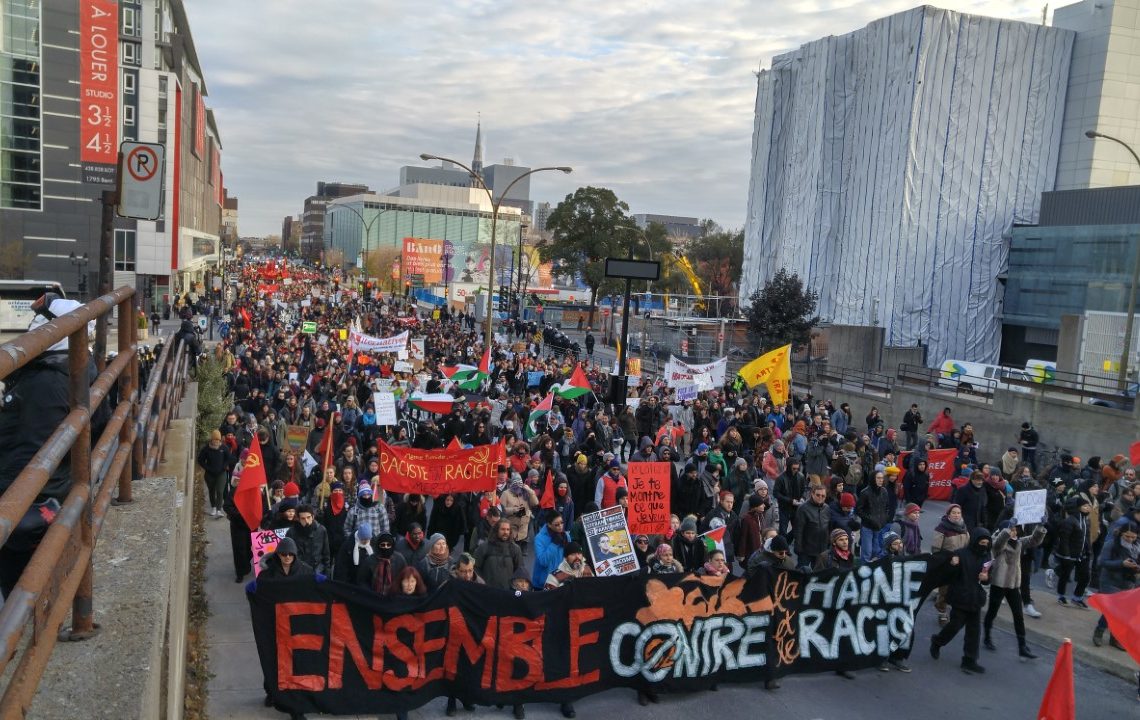The streets of Montreal were taken over by more than 5,000 demonstrators on November 12 in a powerful protest against the far right. The march was festive and colourful, with two banners leading the way that read “United against hate and racism” and “Montreal Antifascist.”
This mass demonstration sent a clear message: there are far more people in the province of Québec who favour solidarity and inclusion than hate and racism.
The success of this demonstration was the result of a careful strategy aimed at uniting as many groups of civil society as possible around a clear anti-racist, pro-immigration agenda, and against the rise of the far right.
The organization for this demonstration emerged months ago from a loose network of anti-racist and anti-fascist allies who decide to work to broaden anti-fascist action beyond the radical left. The idea was to produce clear and accessible information material on a massive scale, and gather as much support as possible for a mass rally that would happen months later.
In a matter of weeks, the declaration calling for the rally was endorsed by more the 160 organizations, ranging from labour unions and community groups to immigrant defense associations and student unions.
This movement was not spontaneous: it required a dedicated effort to personally contact the different groups and convince them of the importance of the rally.
A number of obstacles had to be overcome: many people of colour were skeptical of anti-fascist networks, labour unions were afraid to endorse a clear anti-racist rally because of the reaction of some members, and community groups had their own struggles to address.
But once a critical mass of organizations came together and key groups from different milieux were ready to endorse the call, the number of signatories rose quickly.
From September onward, the organizing committee for the rally also published a bilingual newspaper, printing 11,000 copies, along with tens of thousands of flyers and posters, plus a website.
The large number of groups supporting the rally provided a key network to distribute the materials, but the goal was to reach beyond this. Therefore, two broad assemblies were organized to include more people in the planning of the mobilization.
Teams were set up to organize distribution of the newspaper in subway stations and coffee shops, and to display the posters around the city. Workshops were also planned on different campuses to talk about the rise of the far right and the importance of organizing.
Broadening Support for Anti-racist and Anti-Fascist Politics
Thus, the rally on November 12 was not only a show of force against the rise of hate and racism, but it also acted as a catalyst to engage with colleagues, friends and neighbours around questions of racism. It forced large organizations such as labour unions to position themselves on this issue. And in the end, it broadened significantly the support for anti-racist and anti-fascist politics.
While the rally was initially targeted against the far right, it is also important to stress that the Liberal Party government in Québec passed a bill a few weeks ago to ban women from wearing burqas and niqabs while on public transportation. This same government also canceled a commission that was supposed to investigate the problems of systemic racism in the province.
Those decisions are directly related to the rise of an anti-Muslim intolerance in popular opinion that has been fed by the global rise of the far right. The government took these actions because it felt it could tap into popular sentiment and gain ground against its conservative rival.
The November 12 rally was therefore also a demonstration against these injustices committed by the provincial government.
The far right isn’t only composed of tiny groups with fanatical ideas—hate and racism have been normalized to a dangerous point. But the success of this rally gives hope for the future in Montreal: it enabled a large variety of groups to collaborate for the first time on issues of racism and immigration.
Now, we must consolidate this front and continue the fight.
Alain Savard is a socialist based in Montreal and a PhD candidate at York University. He was part of the organizing committee of the November 12th rally in Montreal.
This articles is also appeared at socialistworker.org.


